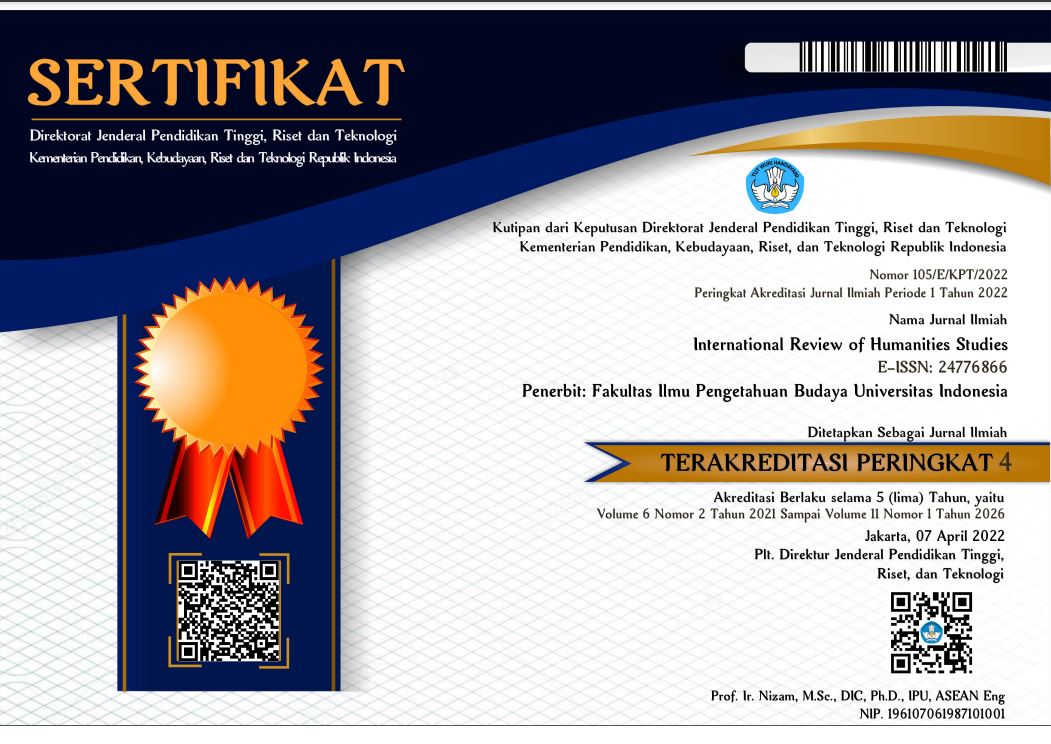International Review of Humanities Studies

Abstract
Studies on the construction of women in Nollywood films have majorly focused on the subjugation of women by the phallocentric African men and the need for socio-economic liberation. Most of these films perceive women as a socially constituted homogenous group on the basis of shared oppression. However, this study intends to interrogate gender relations in terms of the way cultural and development policies are currently regulating the balance of power between men and women in a rapidly mutating African society. Through a reading of select Nigerian films, the paper examines how Nollywood films construct the heterogeneous roles performed by men and women in Modern Nigeria. The paper submits that the dynamics of modernity is changing the depiction of perception of the female gender in contemporary Nigerian cinema.
References
Bamidele L.O. (2000) Literature and Sociology. Ibadan: Stirling Horden Publisher (Nig) Limited.
Cloete A.L. (2017) “Film as Medium for Meaning making: A Practical Theological Reflection”.
HTS Teologiese/Theological Studies, 73(4), 1-6.
Faniyi O (2019) “Lionheart. Nigeria”. The Republic (www.republic.com.ng) Retrieved July 13,
2022.
Izugbara C.O. (2005) “Patriarchal Ideology ad Discourses of Sexuality in Nigeria”.
Sexualization and Sexuality Discourse in Nigeria. Lagos: Africa Regional Sexuality Resource Centre, Seminar Series 2, 1-34.
Kolker R. (2006) Film, Form and Culture. New York: McGraw-Hill Companies Inc.
Kord S. and Krimmer E. (2005) Hollywood Divas, Indies Queens, and TV Heroines:
Contemporary Screen Images of Women. Lanham: Rowman and Littlefield.
Momsen J. (2010) Gender and Development (Second Edition). London and New York: Routledge.
Ododo S.E. & Labiran E.L. (2012) “Postcolonial Gaze and Gender Inequality in Nigerian Home
Video Films. Adeoye A.A. (Ed.) The Dramaturgy of a Theatre Sociologist: Festschrift in Honour of Ayo Akinwale. Ilorin: Performing Arts Department, 401-412.
Okereke G.E. (1998) “African Gender Myths of Vocality and Gender Dialogue in African
Literature”. M.E.M. Kolawole (Ed.) Gender Perceptions and Development in Africa.
Lagos: Arrabon Academic Publishers, 133-158.
Oralusi T.A. (2017) “Gender and Quality Assurance in Music and Songs of Selected Nigerian
Female Artistes”. The Performer, Vol. 19, 27-34.
Stewart C. and Kowaltzke A. (2007) Media: New Ways and Meanings. Sidney: Jacaranda.
Kan T. “Genevieve Nnaji’s Lion Heart: A Wise and Well Helmed Movie” www.thelagosreview
Retrieved July 13, 2022.
Ukuma T.S. (2012) Stereotypic Femininity and Gender Balance Ideals in Nigerian Home Videos:
A Focus on the Female Character Craftmanship”. Markurdi Journal of Arts and Culture, 10(1), 193-206.
Yusuf Y.K. (1998) “Gender Bias and Images of Women in English and Yoruba Proverbs: A Cross-
Cultural Approach”. M.E.M. Kolawole(Ed.) Gender Perceptions and Development in Africa. Lagos: Arrabon Academic Publishers, 63-82.
Recommended Citation
Olayiwola, Abiodun
(2023)
"GENDERED NOLLYWOOD: THE CRISIS OF FEMININITY IN CONTEMPORARY NIGERIAN FILMS,"
International Review of Humanities Studies: Vol. 8:
No.
1, Article 15.
DOI: 10.7454/irhs.v8i1.1014
Available at:
https://scholarhub.ui.ac.id/irhs/vol8/iss1/15


